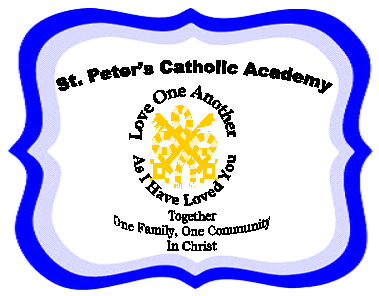History
Our History Leader is Mrs Finney –

When I became History leader at St. Peter's, I was so excited – I have always loved the subject and our local area is full of amazing History that we can all learn from. What an exciting journey we are on!
History is all around us.

At St. Peter's we value, and are dedicated to, the teaching and learning of all aspects regarding History; we see this as a fundamental part of school life. We believe that by providing a curriculum rich in History, we can contribute to the quality of our children’s lives, both within and beyond school. Our children are very proud of our local area and the history it has.
At St. Peters’ we are all Historians. This is what our children have said,
- “I love History! When I am older, I want a job to do with History.” Year 4 pupil
- “I love finding out about the past, it is where we came from.” Year 2 pupil.
Intent – How do we teach History?
Our historical aim is for all children to have an understanding of key periods in history and to learn to ask questions about why things have happened in the past and the impact of those events today.
To build on their prior knowledge and use their skills in enquiry, analysis, evaluation, and argument.
To develop their interest in the past, arousing their curiosity and motivation to learn.
This vision is achieved by:
- A curriculum that builds on an understanding of chronology/key periods
- A curriculum that promotes children’s curiosity and a desire to ask questions
- A curriculum that develops an appreciation of the influences of the past.
At St. Peter's, we believe history engages the children’s interest and understanding of the life of people who lived in the past. We aim for children to develop a sense of identity and a cultural understanding based on their historical heritage. The local environment, which is rich in history, is promoted throughout the school. We teach children to understand how events in the past have influenced our lives today; we also teach children to investigate these past events and, by so doing, develop the skills of enquiry, analysis, interpretation and problem-solving. We encourage children to express their own opinions about events in the past.
The primary curriculum for History aims to ensure that all pupils:
- Know and understand the History of these islands as a coherent, chronological narrative, from the earliest times to the present day: how people’s lives have shaped this nation and how Britain has influenced and been influenced by the wider world
- Know and understand significant aspects of the History of the wider world: the nature of ancient civilisations; the expansion and dissolution of empires; characteristic features of past non-European societies; the achievements and follies of mankind
- Gain and deploy a historically grounded understanding of abstract terms such as ‘empire’, ‘civilisation’, ‘parliament’ and ‘peasantry’
- Understand historical concepts such as continuity and change, cause and consequence, similarity, difference and significance, and use them to make connections, draw contrasts, analyse trends, frame historically-valid questions and create their own structured accounts, including written narratives and analyses
- Understand the methods of historical enquiry, including how evidence is used rigorously to make historical claims, and discern how and why contrasting arguments and interpretations of the past have been constructed
- Gain historical perspective by placing their growing knowledge into different contexts, understanding the connections between local, regional, national and international History; between cultural, economic, military, political, religious and social History; and between short- and long-term timescale
This vision is achieved by:
- A curriculum that builds on an understanding of chronology and concurrency of key periods
- A curriculum that promotes children’s curiosity and a desire to ask questions
- A curriculum that develops an appreciation of the influences of the past
Historical Vocabulary.
We believe that historical vocabulary is related to a child’s success in the subject, and we aim to increase the breadth of pupils’ vocabulary. Therefore, we follow a whole school progression tracker. We ensure the vocabulary makes us speak and learn like a historian.
History is all around us – look at all the special things we have taken part in.
At St. Peter's, we are all historians.
Year 6 have enjoyed investigating the Egyptians, they linked their learning to Art –

What a fun way to learn about the Great Fire of London for Year 2 –
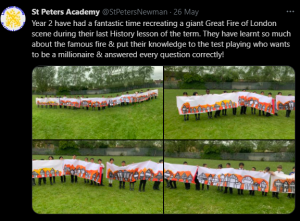
Remembrance Day 2020.
Due to COVID restrictions, we could not remember the soldiers who fought for us to live peacefully as a Whole School. So together, in our class bubbles we all produced part of an amazing Remembrance display. Each class bubble visited it throughout the day for prayer and quiet reflection. We also thought about the families affected by COVID during this time.

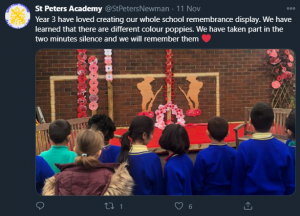
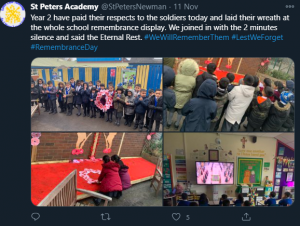
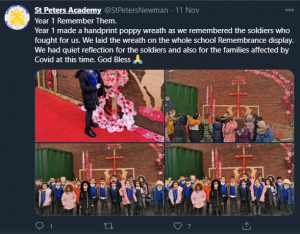
Making History fun!
We enjoy making History fun and being creative. Here are just a few of our exciting and engaging lessons.
Year 5 went to Hanley Museum and designed and made Greek pots.

Year 3 had fun cave painting. They used sandpaper and sticks!
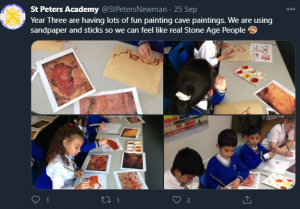
Year 1 are learning about toys in the past. Their class text is Old Bear. They wrote to the author Jane Hissey who promised to write back!
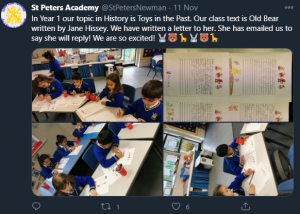
We would love you to continue your learning at home –
Whole School:
- http://www.bbc.co.uk/history/forkids/
- http://www.bbc.co.uk/schools/websites/4_11/site/history.shtml
- https://www.natgeokids.com/uk/category/discover/history/
KS1:
- http://www.fireoflondon.org.uk/the-game/
- http://resources.hwb.wales.gov.uk/VTC/how_toys_change/eng/Introduction/MainSession.htm
- http://www.forms.bedford.gov.uk/museumeducation/bedfordbytes/toys/describing_toys.htm
- https://www.bbc.co.uk/bitesize/topics/zd8fv9q
KS2:
